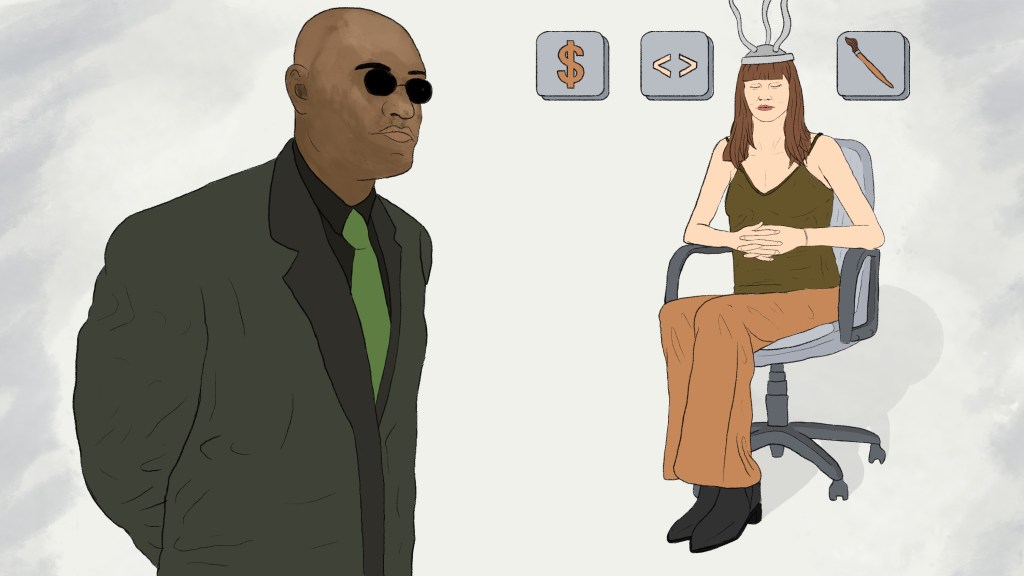This article is supported by TAFE Queensland, who can help give you the skills for a range of jobs. In this series, we look at work life and careers.
Driverless cars are already being phased in, hoverboards exist, and some Japanese geniuses have worked out how to hack vegetables to make them talk. Technology is changing quickly, which means that the job you’ve got your eye on might not even exist in ten years. Like remembering to take last night’s pizza box out of the bed before you get into it, there are things you can do now for your career that future-you will thank you for.
Videos by VICE
We asked four people, who aren’t from the future but know what we need to get through it, about how we can set ourselves up now to make sure we’re not completely replaced by robots.
THE FINANCIAL ADVISOR
To have the best chance of succeeding in the future, you basically need to be better than an app. If you’ve ever lost 4 hours of your life deep-diving into the history of teacup piglets on Wikipedia, you’ll know that we already have an overwhelming amount of information at our fingertips. The human race needs to work out what we can offer over our AI counterparts.
“There’s a tech overload at the moment, there are so many options for everything. It’s now more about helping clients cut through the noise and coaching them on how to use this technology,” financial advisor Ben Nash tells VICE.
Future-proofing yourself isn’t just about understanding technology, it’s about knowing how to use it in meaningful ways. Like using it for productivity, not procrastination, so you can keep all your annoying admin stuff under control and spend more time on your actual job.
THE DIGITAL PRODUCER
“Everyone is a producer these days. Everyone is creating their own content, their own imagery. Everyone’s an expert in self-representation, marketing, and branding,” says filmmaker and digital producer Kate Blackmore.
“Employers really want you to be multi-skilled in lots of different areas.”
This means we’re basically a generation of hyper-skilled super-humans wearing dog filters. So how do we stand out from the crowd?
Well, just remember you’re a human. A good story will always be a good story, so keep an emotive connection to your audience front of mind whether you’re writing social media copy or releasing an immersive VR masterpiece.
“If you always have something important or worthwhile you want to convey then it doesn’t really matter what technology you use,” Blackmore tells VICE. “The technology comes second.”
THE DESIGNER
With all the information available and our need to be able to do 1 million things at once in the workplace, we can put some pretty unrealistic demands on ourselves to keep up.
But, as illustrator and designer Ngaio Parr points out, “Know that you’ll never know it all—as much as you might want to—and that it is okay.”
“Get comfortable in feeling uncomfortable. Learning is the best state to find yourself in at all times.”
She suggests getting offline where possible. Taking part in the community is good not just for that weird little thing called networking, but also to be across new developments in your industry and to actually talk to people IRL.
We often forget about re-skilling when we’re talking about career development, but it’s just as important as learning new things. Stay on top of the tools and programs you already use.
THE SOFTWARE DEVELOPER
“Learn or die,” says Paul Hauner, a blockchain consultant and developer. There are kids in primary school right now learning how to code, so you’d better keep up.
“Learn how to code. Learn how to code. Learn how to code.”
That doesn’t just mean learning new software, it’s also about surrounding yourself with people who are smarter than you so that you can swap ideas. “A course should always be your first step on a long journey. Embed yourself in a network of enthusiastic people. They will help you grow and you’ll be learning whenever they’re around.”
Technological advancement touches all industries, but IT is one of the most obvious. “It changes a little each day, and a lot each year,” says Hauner. “The change is manageable though. If you keep an interest in new tech and keep learning, you’ll be changing as well. You won’t even notice the industry change.”
This article is supported by TAFE Queensland. You can find out more about their diplomas here.
More
From VICE
-

Photo: Anton Petrus / Getty Images -

Huge new game reveals at the 2025 Game Awards -

Photo: Yulia Reznikov / Getty Images

